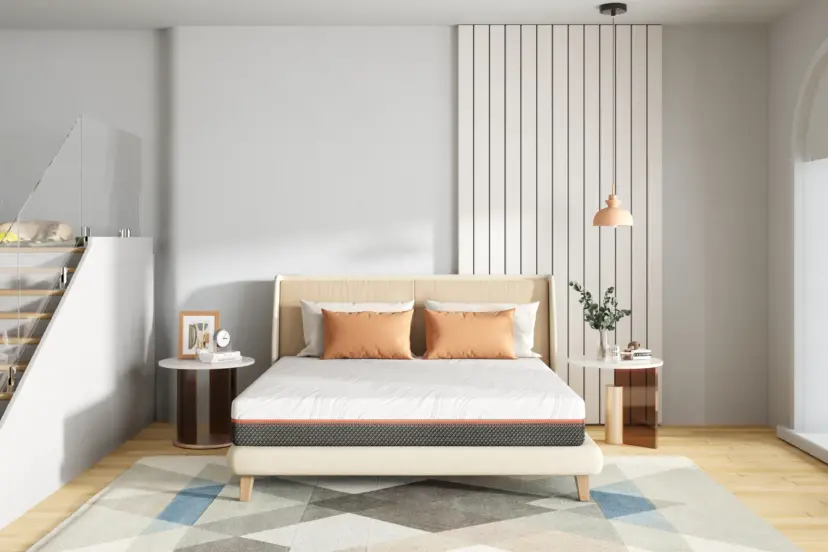Affordable Mattress without Fiberglass
When it comes to selecting a mattress, safety and comfort are paramount. Many buyers are now seeking affordable mattresses without fiberglass, a common fire retardant in mattresses that can pose health risks. This blog post “Affordable Mattress without Fiberglass” delves into the essentials of choosing a fiberglass-free mattress that guarantees safety without breaking the bank.
What is Mattresses without Fibreglass
Fiberglass-free mattresses offer safe sleep by avoiding fiberglass, a common fireproofing material. When fiberglass shards go airborne, they risk health if breathed in or if they touch skin. These mattresses use natural or alternative fire-retardants like wool, silica, or organic cotton. They provide equal fire protection minus the health dangers. Opting for a fiberglass-free mattress ensures a comfortable rest without the worry of fiberglass-related airborne irritants.
The Importance of Choosing Fiberglass-Free
Choosing a fiberglass-free mattress is crucial for maintaining a healthy indoor environment. Fiberglass, often used in mattresses for its fire retardant properties, can be a hidden hazard. If the mattress cover is removed or wears down over time, microscopic fiberglass particles can escape, contaminating the air and surfaces in your home. These particles can irritate the skin, eyes, and respiratory system, leading to discomfort or more serious health issues, especially for those with asthma or allergies. A fiberglass-free mattress eliminates this risk, ensuring that your sleep environment remains safe and does not contribute to indoor air pollution. Furthermore, it supports long-term health and well-being, proving essential for anyone looking for a safe and sound sleep experience.
Key Considerations for a Safe Mattress
- Natural Fire Retardants: Seek mattresses that use wool, thistle, or silica as natural fire retardant layers instead of fiberglass.
- Quality Materials: Prioritize mattresses made from high-density foam, organic cotton, or natural latex which ensure durability and non-toxic sleep environments.
- Certifications: Look for certifications such as GREENGUARD Gold, GOTS (Global Organic Textile Standard), and GOLS (Global Organic Latex Standard) which indicate lower chemical emissions and sustainable manufacturing processes.
- Removable Covers: Choose mattresses with removable and washable covers to maintain hygiene without exposing the inner materials that could contain harmful substances.
- Ventilation: Good airflow within the mattress not only offers cooling benefits but also reduces the risk of moisture retention which can lead to mold and mildew, potential health hazards.
- Transparency: Manufacturers that provide full disclosure of mattress materials and the chemicals used in production are preferable for ensuring safety.
- Warranty and Trial Periods: A company confident in the safety and quality of their mattresses often provides substantial warranty periods and risk-free trial periods.
- Customer Reviews and Ratings: Current users’ experiences can provide insights into the safety and comfort of the mattresses, especially regarding any potential off-gassing or skin irritation issues.
- Company Reputation: Companies with a long-standing reputation for quality and safety are generally more reliable. Their business longevity can be indicative of consistent product standards.
By considering these points, consumers can make informed decisions and invest in a mattress that ensures a safe and comfortable sleep environment.
Top 5 Brands for Fiberglass-Free Mattresses
- Sleepy’s Green
- EcoRest MM Foam
- Pure Comfort
- Nature’s Embrace
- Safe Slumber
1. Sleepy’s Green
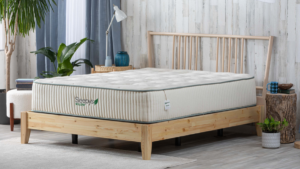
The Sleepy’s Green mattress is an eco-friendly option designed for sleepers who are conscious about their environmental footprint. It combines comfort with sustainable materials, offering a guilt-free path to a good night’s rest.
- Pros: Environmentally friendly materials, supports good sleep hygiene.
- Cons: May have a higher price point due to eco-friendly construction.
- Material: Made with natural and recycled materials, often including organic cotton or bamboo.
- Firmness: Typically comes in a medium firmness to cater to a wide range of sleepers.
2. EcoRest MM Foam
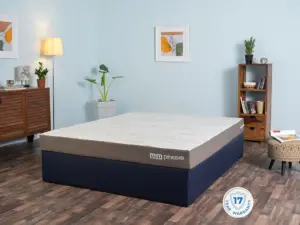
EcoRest MM Foam mattresses are crafted to provide an eco-conscious sleep solution with a focus on minimizing the use of harmful chemicals and leveraging the natural comfort of foam.
- Pros: Utilizes eco-friendly production processes, offers a hypoallergenic surface.
- Cons: Foam may retain more heat than other materials.
- Material: Memory foam with a percentage of plant-based or recycled materials.
- Firmness: Often ranges from medium to firm to ensure both comfort and support.
3. Pure Comfort
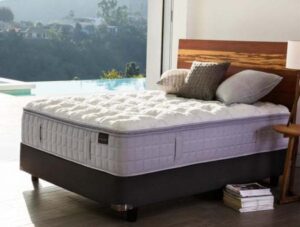
Pure Comfort mattresses are designed with the aim of delivering a comfortable, restful sleep experience using materials and craftsmanship that prioritize durability and body support.
- Pros: Durable design, made for long-lasting comfort and support.
- Cons: Might be on the firmer side, which could be uncomfortable for some.
- Material: High-density foams and possibly additional layers like gel or latex for comfort.
- Firmness: Generally on the firmer side to provide enhanced support.
4. Nature’s Embrace

Nature’s Embrace mattresses focus on harnessing the natural properties of latex to provide a supportive and body-contouring sleep experience that is both comfortable and eco-friendly.
- Pros: Natural latex offers excellent support and durability, hypoallergenic properties.
- Cons: Latex mattresses can be heavy and difficult to move.
- Material: Primarily made from natural latex, often with organic cotton or wool coverings.
- Firmness: Available in a range of firmness levels, from soft to firm.
5. Safe Slumber
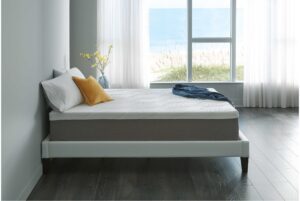
Safe Slumber mattresses offer a sleeping solution that emphasizes safety and health, often featuring fire-resistant materials and hypoallergenic fabrics suitable for all ages.
- Pros: Focus on safety features, hypoallergenic and often antimicrobial materials.
- Cons: The emphasis on safety may lead to a compromise on plush comfort.
- Material: Fire-resistant fibers and hypoallergenic foam or fabric options.
- Firmness: Typically medium-firm to ensure a safe and supportive sleep surface.

